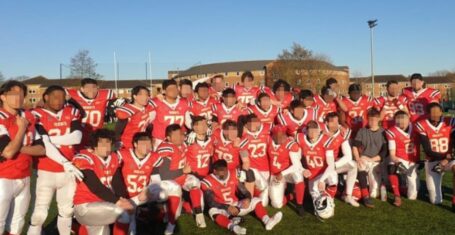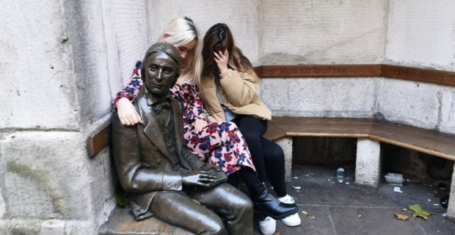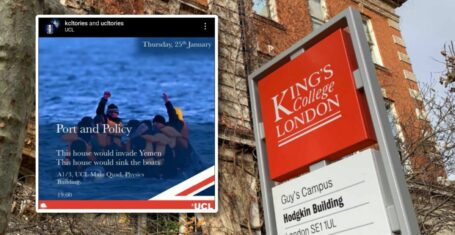
Everything you need to know about the strikes at King’s
Strikes start tomorrow
If you haven't been living under a rock, you'll know King's UCU have confirmed strikes during February and March.
Here's everything you need to know.
Strikes happened back in 2018 – why is this still going on?
This wave of strikes follows the 2018 strikes at King's, and eight days of UCU strikes in November and December 2019.
King's did not take part in the strikes last autumn because, although 83 per cent of those who cast a vote were in favour of strike action, the turnout, at 48.47 per cent, was just 21 votes short of the legal minimum threshold of 50 per cent, preventing industrial action from proceeding.
King's UCU commented: "The 2018 strike was successful – or so we thought."

2018 industrial action at King's
The 2018 strikes led the employers' body Universities UK (UUK) to alter their position on the pensions scheme. A joint working group between the lecturers' union (UCU), pension scheme (USS) and UUK was set up, and everyone agreed to a solution.
But after the agreed solution was published, USS rejected it, and UUK took no action to support the agreed recommendations, even though they had been part of the working group that produced them.
King's UCU say that because of this, their members now have "no choice" but to take part in another walkout.
When are the strikes happening at King's?
Week 1: Monday 24, Tuesday 25, and Wednesday 26 February
Week 2: Monday 2, Tuesday 3, Wednesday 4, and Thursday 5 March
Week 3: Monday 9, Tuesday 10, Wednesday 11, Thursday 12, and Friday 13 March
Week 4: Thursday 19 and Friday 20 March
King's UCU explained they avoided reading week because: "strikes are only as effective as the disruption they cause."
They added that, although King's students would probably be "100% on side" if they scheduled strikes for the Easter holidays, this "would provide zero leverage with management."
While the strikes affect current students, King's UCU explained that all "future generations" of students will be negatively impacted if "university management succeeds in its ongoing attempt to downgrade higher education and turn students into consumers."

2018 strikes outside King's Strand campus
Will my lectures and seminars be affected by the strikes?
Staff don't have to tell King's in advance if they'll be striking, meaning the university can't tell students whether their lectures and seminars will be affected.
However, King's UCU advised their members to "always" tell students about the strikes by no later than the night before the lecture or seminar, so no student should be left out of pocket from travelling to campus for no reason.
You should keep your eye out for departmental emails which may disclose which lectures are striking.
Who's going to take part?
Anyone who is a UCU member is expected to take part in the action, including lecturers, graduate teaching assistants (GTAs), IT professionals, librarians, and administrators. As union members, they are expected to participate regardless of whether they personally voted for, or against, strike action.
Striking staff will lose two weeks pay
King's won't pay striking workers, so everyone taking part is going to lose half their monthly salary. Ouch.
There is a hardship fund to support workers who can't afford to lose this money, while staff who can afford to will donate into this fund.
What happens to the money King's saves?
In 2018, UCU asked universities to put the money they save during the strikes (by not paying striking workers) into student hardship funds.
King's declined, instead promising to ring-fence these funds for student-related issues. King's UCU state that King's "have never reported back on what these issues were or what the outcome of this spending has been."
King's said they "will not benefit in any way" from the money they save, promising to "ring-fence" the money and use it to benefit students.
King's added they are in talks with KCLSU about the best ways to use the money. KCLSU said they intend to ask King's students for their views.
Can I get a refund or compensation?
At King's there are around 23 teaching weeks across the autumn and spring terms, and fees are £9,250 a year for many courses.
In the arts and humanities, for a first-year student (with 10 or 12 hours of contact time a week), a one-hour lecture or seminar costs £34 – £40, while a final-year student (with 6-8 hours of contact time each week) is paying £50 – £67 an hour.
This strike, with 14 days worth of missed lectures and seminars, represents hundreds of pounds worth of lost contact hours for each student.
A petition calling for students to receive fair compensation from universities, started around two weeks ago, has already attracted over 15,000 signatures. In 2018, similar petitions attracted around 115,000 signatures.
King's say they are "committed to delivering an educational programme for each student" and "will seek to ensure that students remain able to complete their programmes of study and graduate as anticipated."
Nonetheless, King's will soon publish the process for making a formal complaint about the industrial action.
You can contact KCLSU to get advice about making a formal complaint to King's.
What are the student unions saying?
The NUS
The National Union of Students (NUS) supports the strikes because the action is "part of our wider fight against marketisation and for a funded, accessible and lifelong education. Government reforms have forced higher education providers to fight each other in a 'market' over student fees …
"The logic and forces that have driven down staff's pay, conditions and pensions are the same that have hiked our students’ fees and rents."
The NUS added that many UCU members are also students and NUS members, as postgraduate students can join the UCU for free during their studies.
Although they are students now, many GTAs are "future academics" and will therefore be heavily impacted by the outcome of the dispute.
KCLSU
King's Student Union, the KCLSU, have decided to remain neutral. This is in contrast to their position in 2018, when they supported the strikes and encouraged King's students to do the same.
KCLSU said: "The KCLSU Officer team are taking a neutral stance on the strikes. Our main priority is to support students as best as we can during this time and ensure that their needs and best interests are put first."
What will happen during the strikes?
Striking staff will not be "teaching, researching, holding office hours, responding to emails, fulfilling administrative tasks, attending committee meetings, and organising or participating in events."
Instead, they'll be on the picket lines around King's, which will be in front of most of the main buildings on all campuses. They will aim to educate students about the strike, and encourage staff members and students not to cross the picket lines in solidarity with their cause.

Crowds gather on the 2018 King's picket line, Strand campus
People on the picket line do not have the power to stop people, make them listen, or prevent them crossing the picket line. If you decide to cross the picket line, no one is allowed to try and stop you. If you feel intimidated or witness any problematic behaviour, you can report this to campus security.
During the strikes, buildings will remain open and students can choose to access the libraries and computer rooms. All Student Union buildings, cafes, bars, and spaces will also remain open.
Teach-outs
During the 2018 strikes, King's staff organised teach-outs, a series of talks and events.
King's staff are now arranging teach-outs for the 2020 strikes. These will take place on the picket line and in off-campus venues.
What does this mean for my studies?
King's produced a strikes FAQ. The key points are (unless you are advised otherwise by your Department or lecturers):
-Exam dates won't change
-To ensure no one is disadvantaged because they were unable to learn material due to the strike, Assessment Boards might remove topics from exam papers, change the weighting of assessment methods, or introduce alternative assessment methods
-Assignment deadlines, including dissertation deadlines, won't change
-Assignments might be marked slower
How can I support striking staff?
If you support the strike, here are a few options to show your solidarity:
-Sign the open letter: "King's College London Students support the 2020 UCU Strikes!"
On Thursday, Decolonise KCL, a student-led society that aims to "challenge the structural inequalities and legacy of colonialism in higher education", called on King's students to "show … solidarity" with their teaching staff by signing the letter.
KCL Justice for Cleaners also asked students to sign:
-Tell your lecturers and seminar leaders you support them
-Join a Facebook group of students who support the strikes
-Email Ed Byrne, the Principal of King’s: [email protected]. You could use the NUS' template letter, try the UCU's template letter generator, or write your own
-Encourage KCLSU to support the strikes: [email protected]
-Postgrad? You can join the UCU for free as a student member
-Join workers on the picket lines, attend teach-outs, or talk with staff about what they're doing and why
Why are the strikes happening?
King's UCU offered a "five-second version" of what's happening: "Since 2011, university students are paying more and university staff are making less.
"Our fight for our pensions–and in general for better working conditions–is a fight against this trend and for our capacity to do the best teaching, research and professional work we can, for our students and for King’s as a whole."
Staff at King's are striking in an effort to prevent the value of each person's pension decreasing by nearly a quarter of a million pounds. That's not exactly chump change.
Last September, commenting on the scale of this financial loss, UCU general secretary Jo Grady said: "it is no wonder they [staff] have had enough".
King's UCU say for "many" staff, the pensions scheme has become unaffordable due to falling pay, leaving them with a choice "between being able to pay rent now or in retirement".
UCU members at other universities are striking over the pensions dispute, the pay and conditions dispute, or both.
The pay and conditions dispute, known as the "4 Fights", is about pay, casualisation, workloads and the intersectional pay gap.
–Pay is down by 20 per cent in real terms since 2009
–Workloads are unsustainably high, no doubt contributing to the "epidemic" of academic staff reaching "breaking point" with their mental health
–Casualisation of labour; "precarious" casual employment contracts, including fixed-term, short-term, hourly-paid, and zero-hours contracts
-Little is being done to tackle the ethnicity and gender pay gap
UCU analysis reveals:
-1 in 9 white academic staff are professors, compared to 1 in 33 black academic staff
-There is an overall pay gap of 9 per cent between white and BME staff
-Black academic staff are paid 14 per cent less than white academic staff
-BME staff are underrepresented in senior positions, but overrepresented in more junior roles
King's UCU are not yet clear on why their members voted to strike over pensions but not the 4 Fights (there was no gap between the two issues in October). The turnout for pay and conditions was 48.52 per cent, with over 83 per cent of those casting a vote in favour of a strike.
While this doesn't meet the 50 per cent threshold required for industrial action to occur at King's over the pay and conditions dispute, King's UCU chose to remain positive, saying the vote showed that there are "many people at King’s who are committed to the fight to end casualisation workload creep and pay inequalities".
Related stories recommended by this writer:
• We asked people in the Maughan how it feels to be alone on Valentine’s Day
• Exclusive: King’s spent over £400,000 fixing September accommodation disaster









































